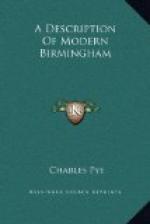Previous to the year 1760, there were very few travellers, (if any,) went from Birmingham with intent to sell the manufactures; the custom at that time, and for many years afterwards, was, for the ironmongers in different parts of the kingdom to bring their money and orders with them, and to wait until the goods were brought in, and see them packed before they left the town. The ironmongers in large towns then supplied their neighbours in smaller places with the different articles, and numbers of people used to attend different markets, where they kept a stock of goods.
This mode of conducting business being both troublesome and expensive, the ironmongers, instead of coming twice a year as some of them did, deputed some person to receive goods on their account, allowing a commission for so doing. This opened the eyes of those who received the goods, and induced them to collect patterns and travel on their own account; which being found advantageous, it has been practised ever since.
Twenty years back the trades carried on in this town were, with few exceptions, light articles, that depended upon fancy, but since that time, there have been numerous works established for manufacturing useful and substantial articles, both for the foreign market and home consumption; and the orders are so extensive that several people keep carts, for the purpose of delivering their own manufacture to the merchant.
Principal Manufactories.
Within this town are manufactured every metallic article, both for use and ornament, that can be necessary in a house; the variety of japan goods, both useful and ornamental, is prodigious; the brass founders produce an infinite variety of articles; and the platers also; the manufacturers of buttons, guns, swords, locks of every kind, jewellery and toys, employ the greatest part of the population. To these may be added a great variety of articles, exclusively for the foreign trade. Lately a manufactory of watches has been established, upon a very extensive scale, in gold, silver, metal, and covered cases.
Birmingham Canals.
In the year 1767 an act of parliament was obtained to cut a canal from this town to the collieries, which was completed in 1769, at the expence of L70000, being 500 shares at L140. each, which in 1782 was sold for L370. in 1792, L1170 was the price of them, and when the first meeting was held respecting the grand junction canal, in the church, at Stony Stratford, one was there sold for L1375. Since that time, the proprietors have been authorised by parliament to divide each share into two parts, which is in fact doubling the number of shares, in order that they may be rendered more saleable, and for one of these divided shares, L900 was offered and refused in the summer of 1818. There is now a regular communication by water between this town, London, Liverpool, Manchester, and Bristol; to the three former places, goods are delivered on the fourth day, upon a certainty; there being relays of horses stationed every fifteen miles.




